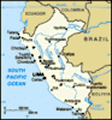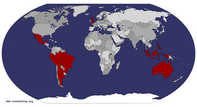Advertisement
Published: December 16th 2010
Puno is a town on the shores of Lake Titicaca, and is famous for being the entrance to the Uros Islands, and the border town to cross from Peru into Bolivia.
We were astounded that someone from Puma hostel was at the bus station to pick us up, despite our bus being one and a half hours late. There was a little man holding a sign reading our names, and we were nothing short of estatic. We were taken to Puma hostel, with whom we had not even made a booking, but had briefly emailed earlier that day saying we were interested in staying, and would it be possible to arrange a pick-up.
When we arrived at the hostel we were welcomed by our lovely host Frida. The hostel seemed to be more of a family home as one of her kids was sitting on the computer doing her homework, and the other was sitting eating dinner. Either way, we were happy to be there with Frida and her family. We were provided with a matrimonial suite which had a hard bed but were just glad for anything having spent so much time on the road as of recent.
We sat down with Frida for a coca tea (made from coca leaves- we had been drinking this since accidently ordering it in Peru thinking it was hot chocolate) and booked our trip to the floating islands and our tourist bus onwards to cross into Bolivia both for the following day. We took a taxi (Frida's husband) into the town centre to have some dinner, where we found a really nice restaurant with a log fire. We ordered steak which came with a baked potato (the first we had seen on our trip) with a starter and a desert for just 12 soles- £3 each.
We caught a taxi back to the hostel which was a little worrying as the taxi driver had no idea where it was. In all fairness it was situated up a really steep hill which when seen in daylight looked like a shanty town. It was one of those buildings that when seen from the back looked as if it was going to slip off the cliff. The taxi driver probably didn't assume there would be a hostel there. Eventually after driving round for ages we found the road thanks to Luke's good sense
of direction.
We fell to sleep as soon as we got in but were woken earlier than planned at around 3.30am when we shared a conversation somewhat like this:
"I just heard 3 gunshots, shall we turn off the light as we are a possible target? I think they're outside our window"
"No you didn't, go back to sleep. What are you talking about?"
"No, I really did. Wait and listen"
A little while later there are more bangs, followed by a percussion of barking offered up by the local strays.
"It's fireworks, go back to sleep"
"Who plays with fireworks at this time?"
"Zzzzzz"
So Katie was left to fret over the possibility of danger while Luke fell back into a blissful sleep. The bangs continued until around 5.30am which we would not have been surprised if it was a shoot out considering our favela-like location.
We got up early for our trip and were fed homemade pancakes by Frida. We were picked up by a minibus loaded with other tourists, and made our way to the port. At the port we boarded a boat and were told all about the Uros Islands. They are situated
just 7km from the shores of Puno on Lake Titicaca, and are basically islands made from reeds. We were told how the lake is the deepest navigable lake in the world, and that it is shared with Bolivia 40% and 60% but the countries disagree over who owns the bigger share. The lake is at high altitude so it is not surprising that it is so deep. We had been feeling the effects of the altitude since arriving in Puno as we had come from relatively low land. We were light headed and lethargic, this is why we had been drinking coca tea, as it apparently makes everything easier. Not surprising as the leaves used in the tea are also apparently used to make cocaine.
Anyway, we made it to the island where we had the opportunity to taste reed banana which is basically the end of a reed, peeled. We were told that it induces diarrhoea, so Luke went ahead and tried it. Katie was dubious- it didn't look appealing. We were also given a demonstration of how the islands are made. The Quechuan people who live on the islands build and maintain them, by binding sections of
roots, then layering them with criss-crossed reeds. It is actually really interesting that these people once lived on these islands and were self-sustainable by hunting and fishing and selling their catch to the local towns. However, it is a shame that nowadays their main source of income is tourism and that they spend their days entertaining local tours and trying to force tourists to purchase souvenirs that are apparently handmade, but we have a strong suspicion that most were made in China. How can the exact replica souvenirs be for sale in Ecuador, Peru, and Bolivia if they are all handmade? There are often ladies who try to sell these goods (mostly wool garments) who sit and knit next to their wares, to give the impression that they hand made the goods on their stalls. We can't be fooled, ladies. We were taken into a little reed house where Katie had the opportunity to dress in Quechuan traditional clothing, and we were able to ask questions. The door was shut and the lady began to spread her wares all over the floor of the hut. We were trapped and the situation felt awkward and we didnt like it. There really
was only one way out, and as we didn't want to purchase a pillow cover, tapestry or reed boat, we instead gave the family a monetary donation.
After this we were offered a ride on a reed boat, but were suspicious it wouldn't be included in the price of our trip, and that money would be demanded after. We inquired and the guide sheepishly informed us that no it was not included, that it was going to cost a fiver for the two of us. For a 10 minute slow boat ride, when we could instead just get back on the boat we had already paid to go on? We were not prepared to pay that sort of money which was the same price as a night in a hostel, and as we had already overspent in Peru, we stood our ground along with a German couple. It became really quite embarrassing as the island ladies would not stop harrassing us to get on the damn boat. Eventually we got back onto our boat that we arrived on, away from the scornful looks of the island ladies. We had already given them some money, and they get money
from our tour as well- we felt that it was completely over the top.
Our boat took us to the next island, which we arrived at a full 10 minutes before the fools who had been bribed into catching the slow boat. We looked around but it was the same as the last place- lots of people trying to sell things. We were hugely disappointed that we were not on the island with the post office. We would have gladly purchased some postcards to send from the only floating post office in the world. We boarded our boat early as we were pretty hot and tired and generally not in the mood. We arrived back to the hostel with an hour to spare to get some lunch before our tourist bus to cross the border into Bolivia.
We arrived at the bus terminal courtesy of Frida's husband's taxi and were pleased to find that La Paz was just a further 3 hours from the border town on Cocacabana, where we would reach in just 3 hours. We could get to La Paz that evening. We boarded the bus which was full of tourists- it felt strange not being
the minority, and comforting in a way. As we were getting on the bus we noticed a thermometer in the terminal flickering between 38 and 40 degrees. We had no idea it was that hot- we were wearing trousers and hoodies, and were not sweltering. We must have become accustomed to the heat.
We arrived at the border crossing which was just a routine affair of getting the relevant documents stamped, and being ripped off by money changers with rigged calculators to purchase some Bolivianos for our onwards bus to La Paz.
Upon arriving in Cocacabana we went against all warnings on the internet- we jumped onto a bus at the side of the road which was headed for La Paz. However, we got on a bus that looked of decent 'quality' unlike some other tourists who had bought their onward tickets back in Peru, and were being herded onto a local bus. They tried to ferry us onto there too, but we saw backpacks being strapped to the roof and stood our ground. We wanted to get on the decent bus. Eventually they gave in and let us on. We were quite adament not to get on
the local bus as we had heard many horror stories about this route, including buses taking travellers to unknown locations and tying them up, demanding credit card pins at gunpoint. This would be an unnecessary hold up on our journey. Also apparently the roads were dangerous, but they were nothing like in Mexico.
We eventually arrived in La Paz and were literally dropped on the side of the road somewhere. The city is situated in a valley and surrounded by thousands of mountains- it was really beautiful to drive into at night. We edged our bets and took a taxi which already had a passenger- the wife of the driver. We like that it is common practise for drivers to take their wives/ children to work with them in South America- it makes us feel safer as we assume they wouldn't kill us in front of them.
A price of 8 Bolivianos was agreed with the woman after we showed the address of Wild Rover hostel to the driver. However, they tried to drop us to the Loki hostel, but we refused to get out and again showed them the address and insisted they took us to the
Wild Rover. When we did eventually find the Wild Rover they tried to charge us 10Bs saying that we had made them go further from Loki. Nice one. We insisted and they gave in and regrettably handed over the change. We have realised this is the only way here- you just have to be strong and then you won't be ripped off.
Advertisement
Tot: 0.1s; Tpl: 0.013s; cc: 11; qc: 62; dbt: 0.0576s; 1; m:domysql w:travelblog (10.17.0.13); sld: 1;
; mem: 1.2mb
























D MJ Binkley
Dave and Merry Jo Binkley
Great commentary
We have been to Puno and enjoyed ourselves. The reed islands are interesting and amazing. Your photos are colorful and beautiful. Thank you for the memories.